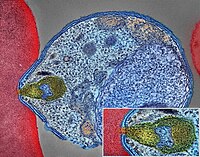
Photo from wikipedia
Background The pathophysiology of the placental malaria is not fully understood. If there is a fetal sex–specific susceptibility to malaria infection, this might add to the previous knowledge on the… Click to show full abstract
Background The pathophysiology of the placental malaria is not fully understood. If there is a fetal sex–specific susceptibility to malaria infection, this might add to the previous knowledge on the immunology, endocrinology and pathophysiology of placental malaria infections. Aims This study was conducted to assess whether the sex of the fetus was associated with placental malaria infections. Subjects and methods A cross-sectional study was performed including a secondary analysis of a cohort of women who were investigated for prevalence and risk factors (including fetal sex) for placental malaria in eastern Sudan. Placental histology was used to diagnose placental malaria infections. Results Among 339 women enrolled, the mean (SD) age was 25.8 (6.7) years and parity was 2.7 (2.2). Among the new born babies, 157 (46.3%) were male and 182 (53.7%) were female. Five (1.5%), 9 (2.7%) and 103 (30.4%) of the 339 placentas had active, active-chronic, past-chronic malaria infection on histopathology examination respectively, while 222 (65.5%) of them showed no malaria infection. Logistic regression analyses showed no associations between maternal age or parity and placental malaria infections. Women who have blood group O (OR = 1.95, 95% CI = 1.19–3.10; P = 0.007) and women who had female new born were at higher risk for placental malaria infections (OR = 2.55, 95% CI = 1.57–4.13; P< 0.001). Conclusion Fetal gender may be a novel risk factor for placental malaria. In this work the female placentas were at higher risk for malaria infections than the male placentas.
Journal Title: PLoS ONE
Year Published: 2017
Link to full text (if available)
Share on Social Media: Sign Up to like & get
recommendations!